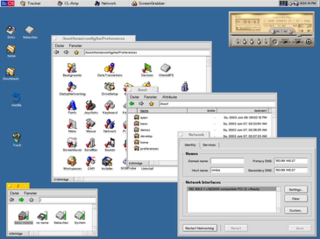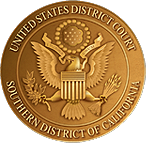Related Research Articles

BeOS is an operating system for personal computers first developed by Be Inc. in 1990. It was first written to run on BeBox hardware.

An operating system (OS) is system software that manages computer hardware and software resources, and provides common services for computer programs.
The Portable Operating System Interface is a family of standards specified by the IEEE Computer Society for maintaining compatibility between operating systems. POSIX defines both the system and user-level application programming interfaces (APIs), along with command line shells and utility interfaces, for software compatibility (portability) with variants of Unix and other operating systems. POSIX is also a trademark of the IEEE. POSIX is intended to be used by both application and system developers.

Computer operating systems (OSes) provide a set of functions needed and used by most application programs on a computer, and the links needed to control and synchronize computer hardware. On the first computers, with no operating system, every program needed the full hardware specification to run correctly and perform standard tasks, and its own drivers for peripheral devices like printers and punched paper card readers. The growing complexity of hardware and application programs eventually made operating systems a necessity for everyday use.

Novell, Inc. was an American software and services company headquartered in Provo, Utah, that existed from 1980 until 2014. Its most significant product was the multi-platform network operating system known as Novell NetWare.
An object-oriented operating system is an operating system that is designed, structured, and operated using object-oriented programming principles.

The Santa Cruz Operation, Inc. was an American software company, based in Santa Cruz, California, that was best known for selling three Unix operating system variants for Intel x86 processors: Xenix, SCO UNIX, and UnixWare.
Merge is a software system which allows a user to run DOS/Windows 3.1 on SCO UNIX, in an 8086 virtual machine.

Internet Explorer for UNIX is a discontinued version of the Internet Explorer graphical web browser that was available free of charge and produced by Microsoft for use in the X Window System on Solaris or HP-UX. Development ended with a version of Internet Explorer 5 in 2001 and support for it was completely discontinued in 2002.
Caldera OpenLinux (COL) is a defunct Linux distribution. Caldera originally introduced it in 1997 based on the German LST Power Linux distribution, and then taken over and further developed by Caldera Systems since 1998. A successor to the Caldera Network Desktop put together by Caldera since 1995, OpenLinux was an early "business-oriented distribution" and foreshadowed the direction of developments that came to most other distributions and the Linux community generally.

The Common Open Software Environment (COSE) was an initiative formed in March 1993 by the major Unix vendors of the time to create open, unified operating system (OS) standards.

Alcatel-Lucent v. Microsoft Corp., also known as Lucent Technologies Inc. v. Gateway Inc., was a long-running patent infringement case between Alcatel-Lucent and Microsoft litigated in the United States District Court for the Southern District of California and appealed multiple times to the United States Court of Appeals for the Federal Circuit. Alcatel-Lucent was awarded $1.53 billion in a final verdict in August 2007 in the U.S. District Court for the Southern District of California in San Diego. The damages award was reversed on appeal in September 2009, and the case was returned for a separate trial on the amount of damages.
Microsoft has been involved in numerous high-profile legal matters that involved litigation over the history of the company, including cases against the United States, the European Union, and competitors.
Locus Computing Corporation was formed in 1982 by Gerald J. Popek, Charles S. Kline and Gregory I. Thiel to commercialize the technologies developed for the LOCUS distributed operating system at UCLA. Locus was notable for commercializing single-system image software and producing the Merge package which allowed the use of DOS and Windows 3.1 software on Unix systems.
Windows Interface Source Environment was a licensing program from Microsoft which allowed developers to recompile and run Windows-based applications on UNIX and Macintosh platforms.

Mainsoft is a software company, founded in 1993, that develops interoperability software products for Microsoft Windows and Linux/Unix platforms.
NetVault is a set of data protection software developed and supported by Quest Software. NetVault Backup is a backup and recovery software product. It can be used to protect data and software applications in physical and virtual environments from one central management interface. It supports many servers, application platforms, and protocols such as UNIX, Linux, Microsoft Windows, VMware, Microsoft Hyper-V, Oracle, Sybase, Microsoft SQL Server, NDMP, Oracle ACSLS, IBM DAS/ACI, Microsoft Exchange Server, DB2, and Teradata.
The Application Programming Interface for Windows (APIW) Standard is a specification of the Microsoft Windows 3.1 API drafted by Willows Software. It is the successor to previously proposed Public Windows Interface standard. It was created in an attempt to establish a vendor-neutral, platform-independent, open standard of the 16-bit Windows API not controlled by Microsoft.
Visionware Ltd was a British software company that developed and marketed products that helped integration of Microsoft Windows clients to Unix-based server applications. It was based in Leeds in West Yorkshire. The three products it was most known for were PC-Connect, XVision, and SQL-Retriever.
References
- ↑ "Bristol Technology Inc., inc5000 Article". Inc. Article. 2007-08-22. Retrieved 2010-07-05.
- ↑ "Windows Interface Source Environment (WISE". January 1995. Archived from the original on 2008-03-30. Retrieved 2008-04-26.
- ↑ "Summary: Bristol Technology v. Microsoft". Techlawjournal.com. Retrieved 2010-07-05.
- ↑ "Document: Complaint in Bristol v. Microsoft, 8/18/98". Techlawjournal.com. 1998-08-18. Retrieved 2010-07-05.
- ↑ Wilcox, Joe. "Judge orders Microsoft to pay Bristol $1 million - CNET News". News.com. Retrieved 2010-07-05.
- ↑ Wilcox, Joe (2001-02-22). "Microsoft settles Bristol lawsuit | Desktop OS | ZDNet UK". News.zdnet.co.uk. Retrieved 2010-07-05.
- ↑ Elizabeth Corcoran, 11.10.03 (2003-11-10). "Death-Defying Acts". Forbes.com. Retrieved 2010-07-05.
- ↑ "United States Patent: 7003781". Linkedin.com. Retrieved 2010-07-05.
- 1 2 HP TransactionVision software – HP – BTO Software Archived October 24, 2008, at the Wayback Machine
- ↑ "Bristol Technology Receives $9.1 Million from JVP, Apax Partners and Existing Investors in Series B Venture Capital Financing. | Banking & Finance > Financial Markets & Investing from". AllBusiness.com. Retrieved 2010-07-05.
- ↑ "IVC Weekly Newsletter - IDC: Israeli BTM start-ups are candidates for purchase". Ivc-online.com. Archived from the original on 2011-07-13. Retrieved 2010-07-05.